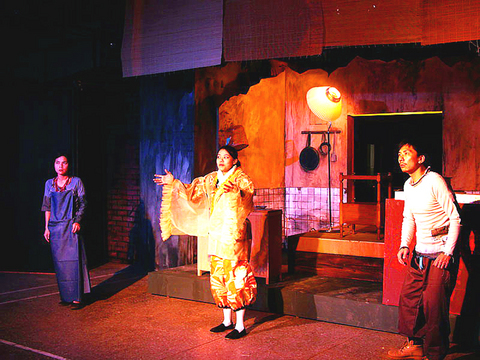From biblical times until the middle of the last century, leprosy was considered one of the most disastrous diseases afflicting humanity. Countless sufferers endured internal exile in lepers' colonies and some were forcibly sterilized.
Leprosy, also known as Hansen's disease after the scientist who in 1878 identified the bacteria that causes the affliction, is curable and not highly contagious. However, discrimination persists into the 21st century.
Taiwanese sufferers of leprosy are currently locked in battle on two fronts.

Construction plans for the Taipei Mass Rapid Transit (MRT) include the demolition of Taiwan's only leprosarium, the 70-year-old Happy Life Lo Sheng Sanatorium (
In the wake of patient protests and petitions, the government is now considering alternative plans.
On a second front, local sufferers of Hansen's disease who were subjected to systematic abuse under Japan's colonial rule over the island have taken their battle for compensation to the courts and won a victory last month when a Japanese judge ruled they were entitled to redress.
Inspired by these struggles, Japanese writer and director Sakurai Daizo penned the play
A harrowing tale of life on the margins of society it is not. At a rehearsal on Tuesday evening, it was evident that
"At a time when nostalgia for Japan's colonial past is on the rise among many Japanese, I wanted to look at the relationship between Taiwan and it's former colonial master," said the playwright who has worked extensively throughout Southeast Asia. "One of the lead characters Oguzi, is both a ghost and a living person who represents how Japan treats Taiwan both economically and politically, today and throughout history."
The ghost Oguzi, a character taken from Japanese folklore, presides over a leprosarium in which the story unfolds. Although no specific reference is made to Happy Life Leprosy Hospital the inference is glaring.
The play dispenses with a linear chronology, frequently switching from the past to the present and back.
After Japan triumphed in the 1905 war with Russia it embarked on a period of imperial expansion. Daizo said his work uses the relationship between nationalism and leprosy at this time to lead the audience to the crux of the play.
"How can we live life in a post-colonial, capitalist society?" Daizo asks.
The group of 12 actors, three of whom are Japanese, came together for this project, but are not part of a formal troupe. Originally scripted as a 2.5-hour play,
The group has invited patients from Happy Life Leprosy Hospital to attend the shows.
Performance notes:
Where: Experimental Theater of the National Theater Hall (
When: Tomorrow at 7:30pm and Sunday at 3pm.
Admission Tickets are NT$400 available through Artsticket. Call (02) 3393 9888 or visit www.artsticket.com.tw/ for more information.

Taiwan has next to no political engagement in Myanmar, either with the ruling military junta nor the dozens of armed groups who’ve in the last five years taken over around two-thirds of the nation’s territory in a sprawling, patchwork civil war. But early last month, the leader of one relatively minor Burmese revolutionary faction, General Nerdah Bomya, who is also an alleged war criminal, made a low key visit to Taipei, where he met with a member of President William Lai’s (賴清德) staff, a retired Taiwanese military official and several academics. “I feel like Taiwan is a good example of

March 2 to March 8 Gunfire rang out along the shore of the frontline island of Lieyu (烈嶼) on a foggy afternoon on March 7, 1987. By the time it was over, about 20 unarmed Vietnamese refugees — men, women, elderly and children — were dead. They were hastily buried, followed by decades of silence. Months later, opposition politicians and journalists tried to uncover what had happened, but conflicting accounts only deepened the confusion. One version suggested that government troops had mistakenly killed their own operatives attempting to return home from Vietnam. The military maintained that the

Before the last section of the round-the-island railway was electrified, one old blue train still chugged back and forth between Pingtung County’s Fangliao (枋寮) and Taitung (台東) stations once a day. It was so slow, was so hot (it had no air conditioning) and covered such a short distance, that the low fare still failed to attract many riders. This relic of the past was finally retired when the South Link Line was fully electrified on Dec. 23, 2020. A wave of nostalgia surrounded the termination of the Ordinary Train service, as these train carriages had been in use for decades

Lori Sepich smoked for years and sometimes skipped taking her blood pressure medicine. But she never thought she’d have a heart attack. The possibility “just wasn’t registering with me,” said the 64-year-old from Memphis, Tennessee, who suffered two of them 13 years apart. She’s far from alone. More than 60 million women in the US live with cardiovascular disease, which includes heart disease as well as stroke, heart failure and atrial fibrillation. And despite the myth that heart attacks mostly strike men, women are vulnerable too. Overall in the US, 1 in 5 women dies of cardiovascular disease each year, 37,000 of them